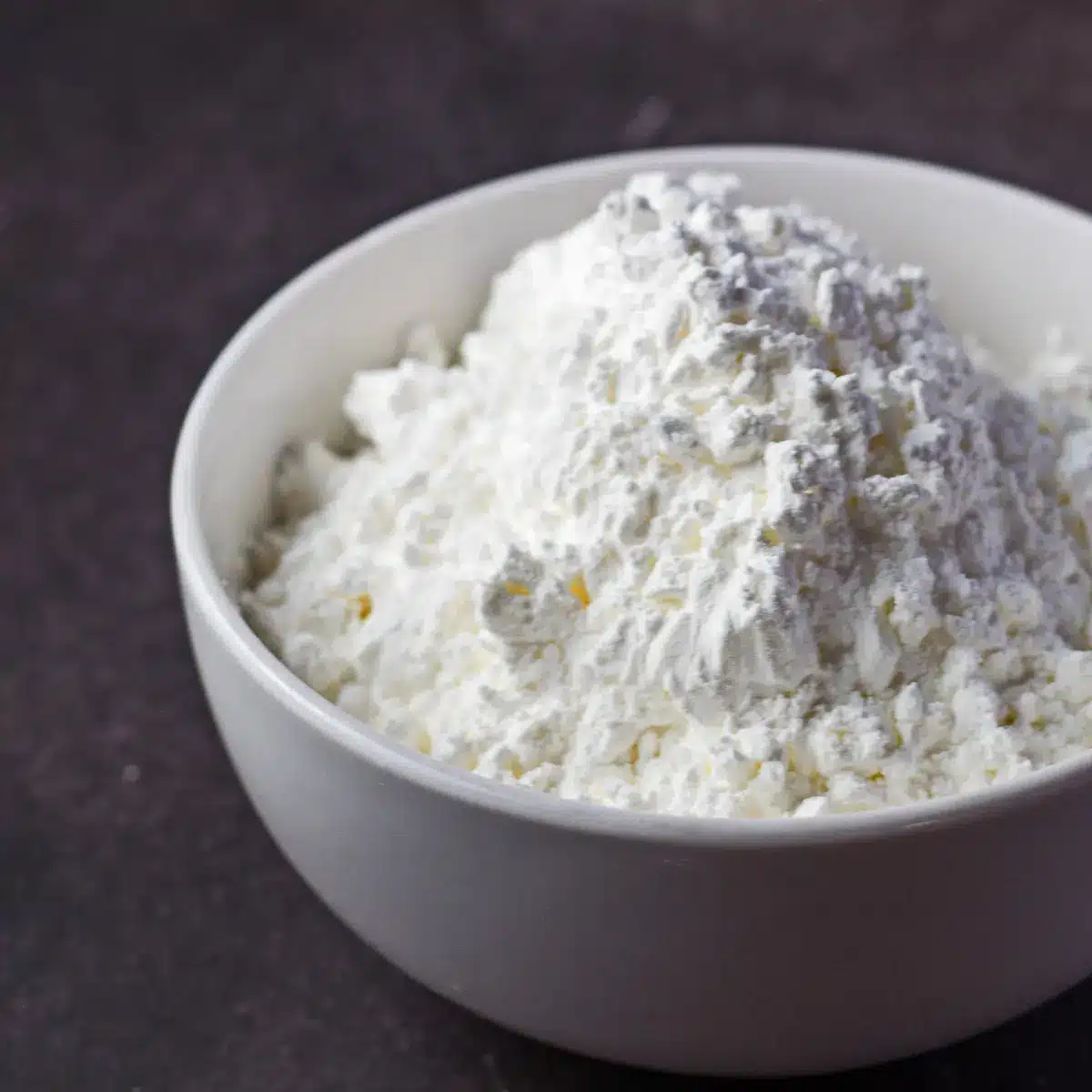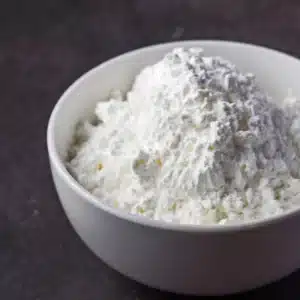Choosing a cornflour substitute is easy with my complete list of all the best substitutes you can swap out in any recipe. From breading, batter, and deep frying to baking fabulous biscuits, cornbreads, and more, this staple ingredient has readily available substitutions you can make on the fly.
Cornstarch and rice flour are my top 2 go-to substitutes, but I share all of my faves here in this guide!

Jump to:
- 12 Best Substitutes for Corn Flour
- 1. Cornstarch
- 2. Rice Flour
- 3. Cornmeal
- 4. Whole Wheat & All-Purpose Flour
- 5. Self-Rising Flour
- 6. Tapioca Flour
- 7. Masa Harina
- 8. Rice, Potato, Tapioca, or Kuzu Starch
- 9. Guar Gum
- 10. Sorghum Flour
- 11. Ground Flaxseed
- 12. Arrowroot Powder
- More Cooking & Baking Substitutions
- ❓ Recipe FAQs
- 📖 Recipe Card
- 💬 Comments & Reviews
Corn flour is a handy ingredient to keep in your kitchen arsenal. It can be used as a coating for your favorite fried foods like chicken or fish but can also be the go-to flour for making quick bread or waffles.
With so many uses, it's no wonder why corn flour is such a popular ingredient. But that doesn't mean that everyone has it in their pantry. If you find your recipe calls for corn flour, but it's not something you keep in your pantry, you need a readily available substitute!
The best cornflour substitutes are ones that are already in your pantry!
12 Best Substitutes for Corn Flour
Below, you will find the top 12 substitutes (+ some extras!) to swap out for corn flour - that work like a charm.
Corn flour is a great ingredient in your kitchen pantry, but it's not a must. You can easily swap corn flour for other great ingredients, depending on the recipe you're making.
Thickeners like arrowroot and kudzu starch are best for soups and sauces. All-purpose flour and cornmeal can be used as breading and coating or mixed into baked goods. They're also wonderful as these are very common pantry items!
Tapioca flour and arrowroot powder are also favorites that I keep on hand, and you'll love them, too 🙂
I always feel that the very best subs are whatever you have on hand, so check your pantry and then decide what's going to work best in your recipe. Let's get cooking!
1. Cornstarch
When people hear the term corn flour, they likely think of cornstarch. The two are very similar, but they are not the same thing.
That doesn't mean that cornstarch isn't a viable substitute, though. Cornstarch can work wonders in place of corn flour as it has the same consistency.
It does not compare in the flavor department, though, so consider seasoning before adding cornstarch instead of cornflour.
Use cornstarch in a 1:1 ratio when substituting for corn flour. Do note, however, that you will still need to mix your cornstarch with cold water, depending on the recipe.
Best used as a thickening agent, breading, or fried batter. Baked goods will tend to be more crumbly if this is used as a sub.
Corn Flour vs Corn Starch
Corn flour is a finely ground powder from the whole corn kernel, while cornstarch is only derived from the starch of the kernels. That said, corn flour has protein, fiber, and other nutrients that cornstarch lacks.
2. Rice Flour
A great substitute for cornmeal is rice flour, especially when used as a thickening agent or in sweet baked treats. Rice flour is a bit stickier and finer than cornmeal, so it shouldn't be used in recipes where a crunchy exterior is desired.
Due to the sweetness of rice flour, it is a wonderful flavor enhancer in certain recipes like soups or muffins.
Use in a 2:1 ratio to cornflour, so twice as much rice flour.
Best used as a thickening agent and in baked goods.
3. Cornmeal
When we're talking about replacing corn flour, it's no secret that choosing another corn-related product might do the trick. With cornmeal (or maize flour), you can achieve the same flavor profile as corn flour.
The biggest difference in using cornmeal is that it has a much coarser texture. This can be great for fried foods or toppings on casseroles, macaroni and cheese, and more.
To match the consistency of corn flour more closely, you can use a food processor on the cornmeal until you reach a finer cornmeal.
See my cornmeal substitute page for instructions on how to make homemade cornmeal using either popcorn kernels or drying your corn!
Replace cornflour with a 1:1 ratio of cornmeal.
>>>See All Of My Tasty Recipes Here!<<<
4. Whole Wheat & All-Purpose Flour
Both whole wheat flour and all-purpose flour can make excellent alternatives to cornmeal. Remember that these flours are not gluten-free, so they may not be the right choice for all bakers and home chefs.
Most people have all-purpose or white flour in their pantry, making this the go-to corn flour replacement. Whole wheat is also a popular choice, especially because it contains much more nutrients than its white counterparts.
White flour will not change the recipe in terms of flavor or texture. Whole wheat flour, on the other hand, can give your foods a malty flavor. While it is not an undesirable flavor, it might not be right for your desired flavor composition.
Use both whole wheat flour and all-purpose flour in a 2:1 ratio, or twice as much as the amount of corn flour called for in a recipe.
5. Self-Rising Flour
I love using self-rising flour (aka self-raising flour) in a pinch. It's just like your all-purpose flour with some baking powder and salt added in to make it ready to bake!
To use self-rising flour as an alternative to cornflour, you'll need to double the amount of self-rising flour for thickening soups, sauces, pie fillings, etc. For breading fried foods, use self-rising flour in a 1:1 ratio.
Note that the amount of salt is negligible in most recipes, but you may want to reduce the amount of salt called for in your recipe. Cook, then adjust the seasoning to taste after the flavors have melded.
6. Tapioca Flour
The uses for tapioca flour are pretty impressive. If you have some on hand, it can be a great replacement for corn flour when the recipe calls for a thickening agent.
Unfortunately, this suggestion isn't ideal for breading or baking. So, unless you're using tapioca flour to thicken, it's best to choose another option.
Use tapioca flour in equal parts to replace cornflour for thickening purposes.
7. Masa Harina
Masa Harina can easily be named as the Mexican and Latin American versions of cornmeal. Masa Harina is made from cooked organic corn, soaked in water and lime juice, and then hulled and ground to cornmeal consistency.
That said, it makes a great substitute for corn flour, especially if your recipe has a Mexican or Latin twist to it.
Typically, I use masa harina in a 1:1 ratio for cornflour replacement, but you may need to experiment depending on the recipe.
8. Rice, Potato, Tapioca, or Kuzu Starch
When looking for the perfect alternative for corn flour, you can't go wrong with starches. Whether you have rice, potato, kuzu, or even tapioca starch hanging around, you can use it in place of corn flour.
Keep in mind that starches will work best as thickening agents for recipes like soups and sauces. Potato starch tends to get clumpy quite quickly, so make sure you're whisking fast when adding potato starch to your ingredients.
For those looking to add more unprocessed organic food items to their diet, kuzu is the way to go. Kuzu (Kudzu) is an herb that has many benefits. It is believed to help with liver damage, improve heart health, and help to calm inflammation.
Each of these cornflour substitutes can be used in a 1:1 ratio of equal amounts to the cornflour needed.
9. Guar Gum
Guar gum is another healthy and cheap option that works perfectly for thickening. You only have to use a small amount of guar gum when replacing corn flour in a sauce or soup recipe. As a bonus, you reap the digestive benefits that guar gum has to offer.
You will need a much smaller amount of guar gum to substitute for cornflour in any recipe. Start with ⅛ the amount of cornflour called for (⅛th of a tablespoon = ⅜th of a teaspoon).
10. Sorghum Flour
Sorghum flour is becoming incredibly popular, especially in the healthy foods community. This flour is derived from sorghum grains and is jam-packed with protein and antioxidants.
Not only that, but it contains essential vitamins and minerals, including magnesium, phosphorus, and B vitamins. When using sorghum flour, it's best to use it as a thickening agent rather than a breading or coating.
Use sorghum flour as a 1:1 replacement for cornflour.
11. Ground Flaxseed
If you're on the hunt for a nutrient-packed corn flour substitute, definitely try flaxseed. The flavor is a bit more bitter, so you might want to add more flavoring to your recipe.
Mix ½ tablespoon of ground flaxseed with 2 tablespoons of water to substitute 1 tablespoon of cornflour.
12. Arrowroot Powder
Arrowroot is another popular starch that can be used in place of corn flour. It can also enhance the flavor profile of your recipe, making it one of the best go-to options.
Since arrowroot is a starch, it's another great choice for thickening but might not work as well in baked goods or as a coating. Use this as a replacement in soups and sauces that will be served immediately.
Substitute for cornflour in a 1:1 ratio.
More Cooking & Baking Substitutions
❓ Recipe FAQs
Yes, you can use plain flour instead of corn flour. Plain flour is going to be one of the best options for all types of recipes. It can be used as a coating for fried goods, a thickening agent in slurries, and in baked goods like bread and muffins.
A lot of people assume that corn flour and cornstarch are the same things. They have similar profiles, but corn flour is made from the whole kernel, while cornstarch is derived from the starchy part of the kernel.
There are plenty of thickening agents that can be used in place of corn flour. White flour, rice flour, cornstarch, tapioca flour, guar gum, and sorghum flour are top-notch solutions for thickening agents. I've listed more above, plus how and when to use them.
No, although they are used in similar ways. Corn flour is specifically derived from the whole corn kernel. Plain flour, or white, all-purpose flour, comes from wheat that has been grain-milled and processed into the flour.
Do you love a recipe you tried? Please leave a 5-star 🌟rating in the recipe card below and/or a review in the comments section further down the page.
Stay in touch with me through social media @ Pinterest, Facebook, Instagram, or Twitter! Subscribe to the newsletter today (no spam, I promise)! Don't forget to tag me when you try one of my recipes!
📖 Recipe Card
Cornflour Substitute (12 of the Best Substitutes)
Ingredients
Option 1 - Cornstarch
- 1 tablespoon cornstarch
Option 2 - Rice Flour
- 2 tablespoon rice flour
Option 3 - Cornmeal
- 1 tablespoon cornmeal
Option 4 - Whole Wheat & All-Purpose Flour
- 2 tablespoon whole wheat or all-purpose flour
Option 5 - Self-Rising Flour
- 1 tablespoon self-rising flour (or 2 tablespoons for thickening sauces and soups)
Option 6 - Tapioca Flour
- 1 tablespoon tapioca flour
Option 7 - Masa Harina
- 1 tablespoon masa harina
Option 8 - Rice, Potato, Tapioca, or Kuzu Starch
- 1 tablespoon rice, potato, tapioca, or kuzu starch
Option 9 - Guar Gum
- ⅜ teaspoon guar gum
Option 10 - Sorghum Flour
- 1 tablespoon sorghum flour
Option 11 - Ground Flaxseed
- ½ tablespoon ground flaxseed (plus water)
Option 12 - Arrowroot Powder
- 1 tablespoon arrowroot powder
(Note: 2x or 3x only changes the ingredient list)
Instructions
Option 1 - Cornstarch
- Use cornstarch in a 1:1 ratio when substituting for corn flour. Do note, however, that you will still need to mix your cornstarch with cold water depending on the recipe.
Option 2 - Rice Flour
- Use in a 2:1 ratio to cornflour, so twice as much rice flour.
Option 3 - Cornmeal
- Replace cornflour with a 1:1 ratio of cornmeal.
Option 4 - Whole Wheat & All-Purpose Flour
- Use both whole wheat flour and all-purpose flour in a 2:1 ratio, or twice as much as the amount of cornflour called for in a recipe.
Option 5 - Self-Rising Flour
- To use self-rising flour as an alternative to cornflour, you'll need to double the amount of self-rising flour for thickening soups, sauces, pie fillings, etc. For breading fried foods, use self-rising flour in a 1:1 ratio.
Option 6 - Tapioca Flour
- Use tapioca flour in equal parts to replace cornflour for thickening purposes.
Option 7 - Masa Harina
- Typically I use masa harina in a 1:1 ratio for cornflour replacement, but you may need to experiment depending on the recipe.
Option 8 - Rice, Potato, Tapioca, or Kuzu Starch
- Each of these cornflour substitutes can be used in a 1:1 ratio of equal amounts to the cornflour needed.
Option 9 - Guar Gum
- You will need a much smaller amount of guar gum to substitute for cornflour in any recipe. Start with ⅛ the amount of cornflour called for (⅛th of a tablespoon = ⅜th of a teaspoon).
Option 10 - Sorghum Flour
- Use sorghum flour as a 1:1 replacement for cornflour.
Option 11 - Ground Flaxseed
- Mix ½ tablespoon of ground flaxseed with 2 tablespoons of water to substitute 1 tablespoon of cornflour.
Option 12 - Arrowroot Powder
- Substitute for cornflour in a 1:1 ratio.



Steve says
Can add to that list, Chinese "Glutinous Rice Flour".
Angela @ BakeItWithLove.com says
Awesome! I'll look into it, thanks Steve!
Justine says
Thank you for this corn flour substitute list. I have several of these options in my pantry and will let you know how things turn out!